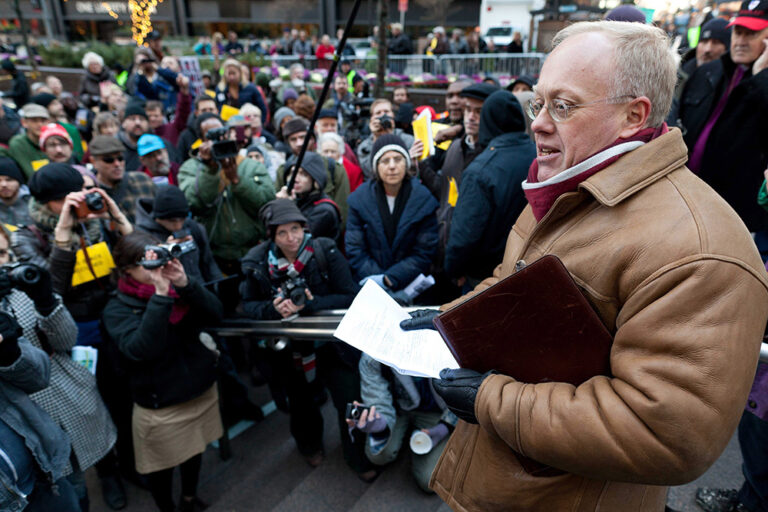Wages of Rebellion: The Moral Imperative of Revolt – Chris Hedges on RAI (pt 3/3)
This is an episode of Reality Asserts Itself, produced on July 8, 2015. On Reality Asserts Itself, Chris Hedges and Paul Jay discuss the Bernie Sanders campaign and the role of violence in revolution.
PAUL JAY, SENIOR EDITOR, TRNN: Welcome back to Reality Asserts Itself on The Real News Network, continuing our discussion with Chris Hedges about his new book Wages of Rebellion. Thanks for joining us again, Chris.
CHRIS HEDGES, JOURNALIST, ACTIVIST, AND AUTHOR: Thank you.
JAY: One of the themes in your book is the role of violence in revolution. And you talk about violence can be a poison for revolution. But certainly there’s times where violence has been necessary for certain revolutions. We talked a little bit off-camera about the Cuban revolution. I mean, most revolutions have had some kind of violence. And you quote Marx a lot, and I quoted you this off-camera. Marx says force is the midwife of change. So when you’re–at some point there may be, I mean, how do you deal with it?
HEDGES: Well, force isn’t–the most effective force is not necessarily violent. And I quote Crane Brinton and Davies, the two great theorists on revolution, early on in the book, who argue, I think correctly, that every successful revolution has included either a defection on the part of significant levels of the organs of internal security, including the military, or a decision by those organs not to use force to defend a discredited power elite. And I think that does hold true for every revolution, whether it’s the Cossacks refusing to fire on the crowds in Petrograd, whether it’s the refusal of the Iranian military to defend the Shah after he flees, same we saw in Cuba when Batista flees, then the military will no longer fight, and you have trucks [incompr.] you know, Castro and his guerrillas riding as fast as they can into Havana.
JAY: But they had won victories in the field, Castro’s troops. I mean, it’s not like they were–there was a combination of mass movement and armed–.
HEDGES: Sure, they had, but I don’t think that that was the tipping point in terms of what allowed the Cuban Revolution to succeed. I mean, if you look at the Algerian, which was–it wasn’t a revolution, but if you look at the Algerian War of Independence, by the time France finally pulled out of Algeria, the FLN was largely defeated, living in bases in Tunisia. But the French were just exhausted. So I think that there–I mean, we’re watching it in Iraq. I mean, the Iraqi Armed Forces have no real will to power, no real desire to fight. They’re–you know, heavily outgun, outnumber ISIS, and yet they drop their weapons and flee. So I think that that is a fundamental point in revolution. And that means that revolutionary forces are able to expose a discredited elite for who it is. And I think we live now in the midst of what Antonio Gramsci would call an interregnum, a period where we have very little faith in our ruling elite. Congress has an approval rating of, what, 7 percent?
JAY: On a good day.
HEDGES: On a good day. You have a host of measures, which we mentioned earlier, from the TPP and wholesale surveillance, etc., etc., bailing out Wall Street, that have no popular support, nobody wants it, but we get it anyway. But in that interregnum, you have yet to articulate, as we spoke of earlier, a vision to take its place. And so there’s the ideological foundations neoliberalism, globalism no longer have currency, the lies that were used to sell us this belief system, that if a global elite became rich, money would trickle down and everyone would have jobs. Well, I think people realize this is false. Alexander Berkman, I also quote his essay Invisible Revolution in the book, where he said that this period of a loss of faith in the ideas that buttress a ruling elite is–he likens it to water boiling in a kettle. So you don’t see it. It’s subterranean. Suddenly you just see the steam and hear the whistle. And I think that’s where we are. I think we’re moving. Now, if we can’t articulate a vision, if we can’t articulate a structure for society that we would like to take the place of corporate capitalism, then because corporate capital has no–it has no internal restraints; it does what it always does, which is maximize profit at the expense of the ecosystem and human societies; and it has no external, virtually, restraints anymore, in terms of regulation or government control; then you are going to get pushback, blowback. But if that blowback is not wedded to an alternative vision, it becomes chaotic and anarchic and is easily crushed. And I think this gets back to the point you raised about Black Lives Matter, that it needs to wed itself to a radical political vision to propel it forward, because then it’s no longer a reactive force. It’s an offensive force. And that’s the period we’re in. Now, whether we’ll get there I don’t know, because the only people who have a clearly demarcated ideological position are the proto-fascists, who are quite numerous in American society–the white supremacists, the neo-Confederates, the Tea Party, the Christian right, the militias, the lunatic fringe of the Republican Party, which may be the entire party. They have a very frightening vision, which is veneration of the hyper masculinity and violence of the military culture. It’s racist. It does what all fascist movements do, which is blame the vulnerable–Muslims, undocumented workers, African Americans, feminists, intellectuals, liberals–for society’s decline. And if things go down, let’s say Wall Street, you know, we get another 2008-like crash, then these forces may be able to seize control. I mean, I find the militarization of American society and the venerating of all things military to be very, very disturbing. So we on the left need to begin to articulate a vision of what we want. And we’re not there yet.
JAY: Yeah, I think it’s very clear that this elite is not fit to rule.
HEDGES: Right.
JAY: But no one else is either, in the sense that there’s no vision for that. And that’s–we’re kind of caught right now.
HEDGES: Well, we’d better get one fast, because–
JAY: Yeah, we’d better.
HEDGES: –if we don’t articulate it before whatever crisis hits us, it may be very difficult to articulate afterwards. There may not be space to articulate it.
JAY: I want to return to one thing you said earlier. You had a big fight, critique of the black bloc tactic during Occupy. And I agreed with that critique, and I didn’t–when I analyzed what was going on in the G-20 events in Toronto, I had a very similar critique, that the 100 or 150 young people or whoever it was in the black bloc tactic and burnt a police car and broke windows in Toronto, it played into the hands of the police.
HEDGES: They love it.
JAY: But what happened in Baltimore changed my mind about a piece of that–not the black bloc tactic, which was quite–like, a small group way out ahead of everyone, kind of marginal, but the spontaneous upsurge of young people who have just had enough, who were cornered by the cops and start throwing stones. I don’t know about the burning of the building, I don’t know who actually did it, but even if you include it, because it represented a kind of more spontaneous mass response, it really did threaten, create a fear. In the way black bloc plays into the hands of police, well, this caught everyone by surprise, the visions of what happened across the United States after the death of Dr. King, and the concession by Mosby on charging the cops–that’s the state’s attorney; the fact that they bring in the National Guard and all the rest, which was, I think, complete overkill and unnecessary and they did it as a rehearsal for martial law, which we said before. But there was something about that spontaneous violence. And it wasn’t–how violent is throwing stones? But it was something that had a kind of radical character to it in the way black bloc tactics don’t.
HEDGES: Well, but you nailed it, I mean, because it was authentic. Black bloc isn’t. So let’s take Oakland. Now, I was speaking with Ishmael Reed and other African-American leaders in Oakland. They were very angry at the black bloc, who they characterized as white, male, middle-class kids coming down from Eugene, Oregon, camping out in Oakland in $600 worth of kneepads and everything else, throwing bricks through windows of local stores. And as Ishmael said, look, if they want to go up to La Jolla, which is where Romney lives, and throw bricks through the windows of rich people’s houses, go ahead. But don’t come into our city and do this. And I was in a march. They shut down four elementary schools in Oakland. And I went and joined the march through my friends who were there, the African-American leadership, which–we have to pay homage to the African-American leadership in Oakland. It is some of the most politicized, most radical, most courageous of all kind of resistance movements in America. And they’ve been fighting longer, harder. And you don’t walk into Oakland without venerating those people and listening to them. So when we did this March against the closing of the elementary schools, the African-American leaders had told the black bloc, you’re not welcome. You can’t march with us. And, look, you go back and look at counterinsurgency tactics, and if you pull the ten goals of any counterinsurgency campaign, it is to demonize the resistance movement and make that movement frightening to the masses. And that’s exactly what black bloc did. They were a gift to the security and surveillance state. I think half of them were probably cops anyway.
JAY: Half I think–certainly based on the Toronto experience, half is a big exaggeration. Big, big exaggeration.
HEDGES: I’m exaggerating. But, I mean, certainly the cops [crosstalk]
JAY: I think in the Toronto situation, most were young activists who–.
HEDGES: But there are cops in there. We know–
JAY: Oh, we know there were. No doubt.
HEDGES: Yeah, because we got–Margaret Flowers got pictures of two people dressed as black bloc getting out of the back of a police van.
JAY: Oh, in Toronto, some of the people that had infiltrated wound up testifying in cases.
HEDGES: Right. So we know they’re there. And they egg it on. And that’s what happened in Baltimore. So we had four days ofd peaceful protest. But what got all the pictures? It got these young kids, who we know were harassed as they got out of school and kind of pushed to the limit. And that’s what the state does. And so you even have the president calling them thugs and criminals. And that’s immediately what the state will attempt to do. And I think what frightened the state with the Occupy movement in New York were these–and I saw it every weekend–these mothers and fathers coming to Zuccotti, pushing their strollers up and down the park. That terrified them. And there is a place for those radical movements. But my argument with the black bloc is you don’t have a right to come into the midst of a nonviolent protest and carry out a tactic that you’re not sharing with anyone else. The consequences of that for undocumented workers, for parents with children, for the elderly, for disabled people is catastrophic. And you may as a young person be able to take off and run down a side street, but they can’t. An undocumented worker who’s out there, their family, their entire life is destroyed if they’re picked up. And you don’t have a right to make them pay that price. So I’m not going to snitch on the black bloc. I mean, if they want to go up to La Jolla and break all of Romney’s windows, I’m not going to report them to the police. Yet at the same time, they were a very destructive element within the movement, and I think the state played a them like a violin.
JAY: Yeah. I thought a lot of the black leadership and young activist leadership in Baltimore took quite a good position on this, the stonethrowing and the sort of more violent response, even the looting, which was it’s not the tactic we recommend, but there’s no way we’re going to condemn our people for using such a tactic.
HEDGES: Right. Well, that is the difference between what happened in Oakland and what happened in Baltimore. The people who carried out that stonethrowing in Baltimore were from Baltimore and they were expressing an anger of being kind of pushed beyond the breaking point, which was legitimate, which is why the state was fearful of it and why the state is not fearful from the black bloc.
JAY: I mean, there were some people that took advantage of the moment. There were a lot of pharmacies broken in and drugs taken and so on, but it’s all an expression of the same underlying social problems.
HEDGES: Right. Well, it is. And, I mean, let’s compare to the looting on Wall Street. It’s kind of nothing. You know, you grab a package of Pampers at a CVS and run down a street, you spend months in jail or get shot in the back. You steal $500 million from Lehman Brothers and every college in the country wants you to sit on their trustee board.
JAY: Of course, it’s not over in Baltimore. People are waiting to see what happens with the trial of the cops.
HEDGES: No, I don’t have a lot of faith in the system, and they probably don’t, either.
JAY: Let’s go back in terms of where we left off about the role of the street violence, the idea of articulating a vision that people can fight for. So how do we get there?
HEDGES: Well, I think that when you see the censorship in the corporate media, it is targeted at those who seek to articulate that vision–Chomsky, Nader, myself. And we’re never going to get on mainstream, because deconstructing the criminality of corporate capitalism and offering an alternative vision is one that the corporate-controlled media has done a very good job of censoring out. I mean, what’s interesting about living in this species of corporate totalitarianism or what Sheldon Wolin calls inverted totalitarianism is that you can have access to that, but it’s largely reduced to print. And because so few people read, the state doesn’t really see the articulation of those visions in print as a threat. Nor do they see those of us who have been pushed to the margins who attempt to articulate this vision as a threat. Now, when you rise up even to reach the city council of Seattle, as Kshama Sawant has done, it’s interesting that even at that level, if they percolate up to that level, that is a threat.
JAY: Well, we’ll see what happens. If we’re successful with this Real News model in Baltimore, with our objective is to compete with and defeat local corporate news, if we win a big market share here, which I think is possible, we’ll see how we get dealt with then, because we’ll perhaps rise to that level. I want to just raise one other thing, which I thought we talked a bit about Bernie Sanders’ candidacy. And I understand the critique of Sanders. But it’s interesting. There was a poll that just came out asking for Americans if they would vote for a socialist, and some of the newspapers I saw that carried the headline, they spun the polling results as if it was a negative, which was–and I think one of the headlines was only I think it was 48 or 47 percent of Americans say they’ll vote for a socialist.
HEDGES: Oh, really? That’s pretty good. We’ll take that.
JAY: It doesn’t take 47 percent to elect somebody. I mean, after so many decades of Cold War propaganda, it’s a very interesting thing that that’s the polling results.
HEDGES: Right, because the demonization of socialism kind of ended in ’89. And so you have an entire generation, the last 25, 26 years, of people who, unlike you and I, weren’t pounded with this red scare junk. And so when they hear the word socialism, it doesn’t have the connotation that it had for our generation when we were growing up.
JAY: I mean, it’s another indictment of mass media, which is if 47 percent of the country is willing to consider voting for a socialist, how come you never hear those voices on the mass media?
HEDGES: Well, because a half-dozen corporations control what we watch and listen to.
JAY: Yeah, sure.
HEDGES: And that’s why they locked Nader out of the debate. And part of my frustration with Sanders is that he’s clearly cut a deal with the Democratic Party. The Democratic Party is part of the problem. He won’t critique the Democratic Party. He–and it’s not hypothetical, because when I did an event with him in New York with Kshama Sawant and Bill McKibben and Naomi Klein, we asked him beforehand why he wouldn’t run as an independent, which is what he should have done. And he said, I don’t want to end up like Nader. Well, and he’s right, ’cause he would have become a pariah. He would have been stripped of his committee chairmanships. The Democratic establishment would have attempted to crush him, going even when he ran for reelection in Vermont. He’s not wrong, because I watched what they’ve done to Ralph. On the other hand, we desperately need somebody to stand up and begin to name the Democrats for who they are.
JAY: But he could do that running in the Democratic Party primary, where–.
HEDGES: He’s not going to do that, and he’s not–.
JAY: Be may not. But as a tactic, he could do it. He would have a much more mainstream stage to do it.
HEDGES: But he wouldn’t get on the debates. And I think that the Democratic Party is–I don’t know this for a fact, but I’m assuming that the deal is you have to support the nominee if you’re going to get on the debates. And they’d lock him out of the debates the way they lock Kucinich out of the debates. Remember, they invented all these rules like you have to be in the top four; by the time it was New Hampshire, I think, or I forget which state it was, he was in the top four, and then they just rewrote the rules. It was mostly out of health care they didn’t want Dennis on.
JAY: What are they going to do? Just have a debate been between O’Malley and Clinton?
HEDGES: I don’t know. Maybe we’ll just watch Clinton kind of parade back and forth across the stage like the queen of England.
JAY: There won’t be any debates.
HEDGES: Yeah. I mean, so I have mixed feeling about Sanders in–you know, he’s not running the typical campaign, which is based on a manufactured personality. He’s actually running on issues. He does not take on the military, by the way, at all. If you look on his website, there’s no mention of the military, which is the–the military-industrial complex is the institution that is largely hollowing the country out from the inside. It’s running our national surveillance. It’s sucking down $1 trillion a year. I mean, six hundred and some billion, but then there’s another $400 billion hidden in other budgets. I have–on an emotional level, because I spent so many months of my life in Gaza and the West Bank, I just can’t betray the Palestinian people. And his betrayal of the Palestinian people–I’m not saying for other people that–but for me, I just have too many friends, I’ve just been in Shifa Hospital too many times looking at the dead bodies of children killed with American weaponry supplied to the Israelis. I can’t–you know, if you’re not going to stand up for the Palestinians, then I just can’t–it doesn’t matter what you’re good on every other issue. I can’t betray them personally. But I also think that we begin to have to build a movement that’s not so parochial, but that’s global. And we can’t pick and choose which oppressed peoples we’re going to support. I think we have to build a movement that says you’re either with all of the oppressed of you’re with none of the oppressed. And this is something that American labor has to begin to grapple with. American labor, as we spoke of earlier, before, off-camera, has colluded with empire. The AFL-CIO was sent off to even countries like France to crush communist labor unions. They worked with the CIA. They were supportive–I mean, you look at Kirkland and George Meany, they were cheering on Nixon’s war in Indochina, denouncing the hippies in the street. Labor has to go back to what labor was at the turn of the century, the last century, which was fused with a radical socialism embodied in figures like Mother Jones and Big Bill Haywood and from the Wobblies and everyone else. We have to build a labor force that is also united with oppressed groups even beyond the borders of the United States, especially since most of our manufacturing is carried out in Dickensonian type conditions in China or Bangladesh or Vietnam and everywhere else.
JAY: I was saying–again off-camera, I was saying that there’s a part of me that doesn’t mind the passing of TPP and NAFTAs and all these free trade agreements, which–the people on the left don’t like me saying that. But there is a positive, in a sense, consequence to it, which is American workers have to really be in solidarity with workers in the developing world, because if they don’t assist those workers to get organized into militant unions, they will be leveraged themselves back into wages very similar to people in the developing world.
HEDGES: Well, they already are. And that’s why we have corporations moving into prisons, where 1 million people now work in our prison system for Target and Victoria’s Secret and Starbucks and Johnson & Johnson and everywhere else. And you have prison administrators going to corporations, saying, you don’t need to run a factory in Bangladesh paying $0.22 an hour. We have a captive workforce right here that can’t organize, you don’t have to pay benefits to. They work for $0.22 an hour. And I think we have to look at the prisons again to see the model for what the corporate state wants, because prisoners are the perfect worker in the eyes of the corporate state. I mean, I hate to see the American worker punished any more than they’ve already been, which TPP and CAFTA are going to do, in order for them to become conscious. I’d like them to become conscious without having them to be, you know, driven even further into the ground.
JAY: Alright. Thanks for joining us.
HEDGES: Thank you.
JAY: Chris will be back. And one more time, his book is Wages of Rebellion: The Moral Imperative of Revolt. Thanks for joining us on Reality Asserts Itself on The Real News Network.
“Christopher Lynn Hedges is an American journalist, Presbyterian minister, author, and commentator. In his early career, Hedges worked as a freelance war correspondent in Central America for The Christian Science Monitor, NPR, and Dallas Morning News.”






